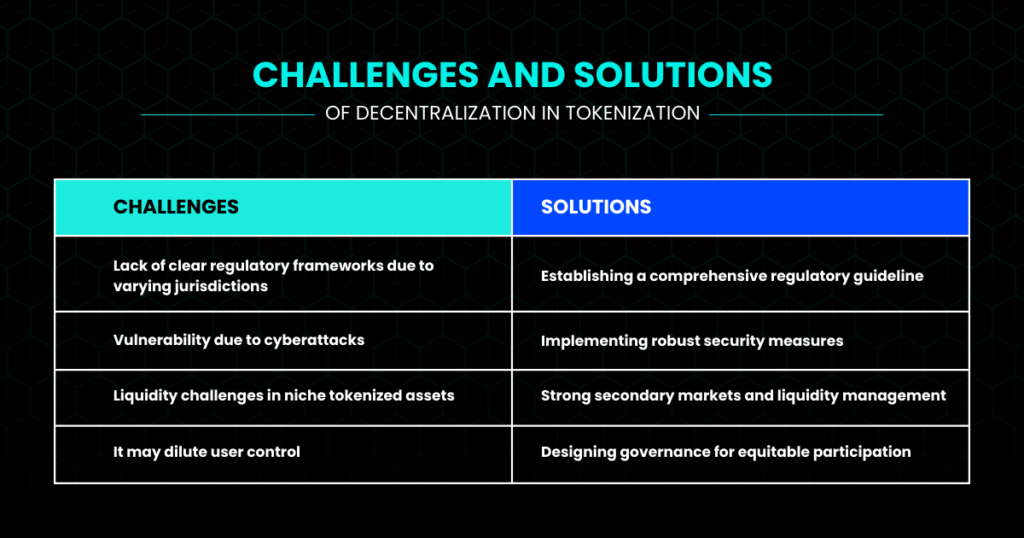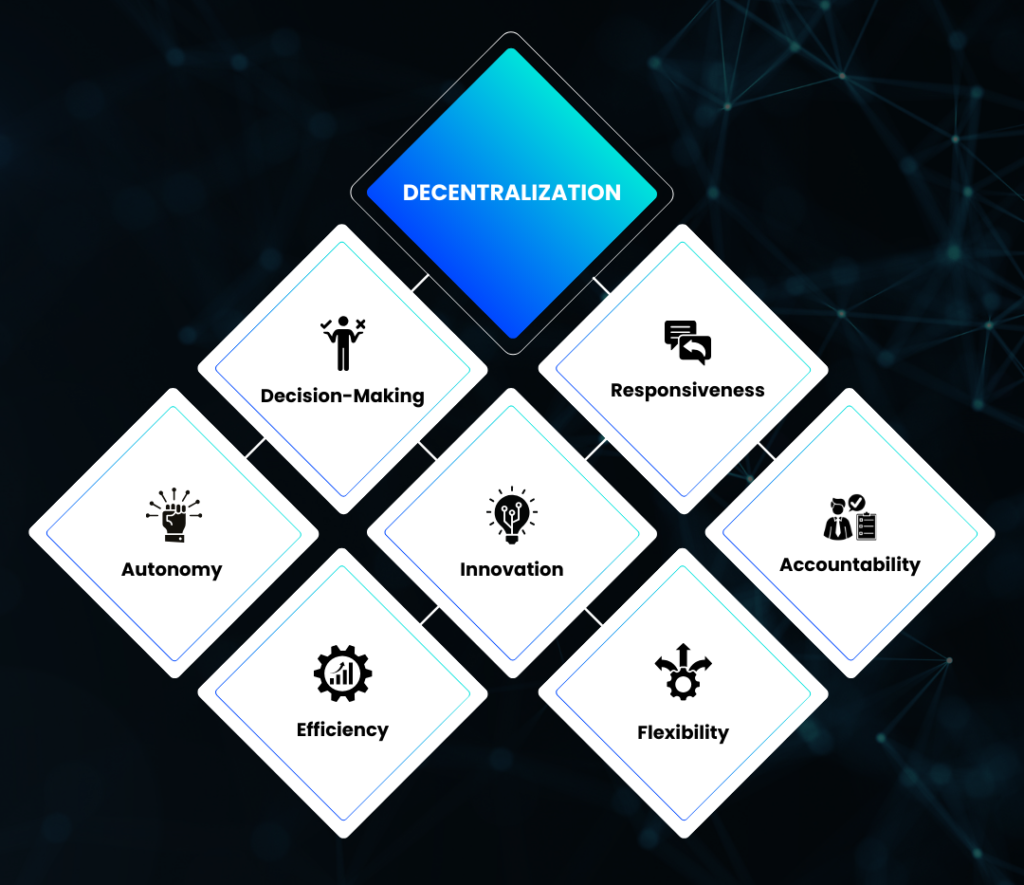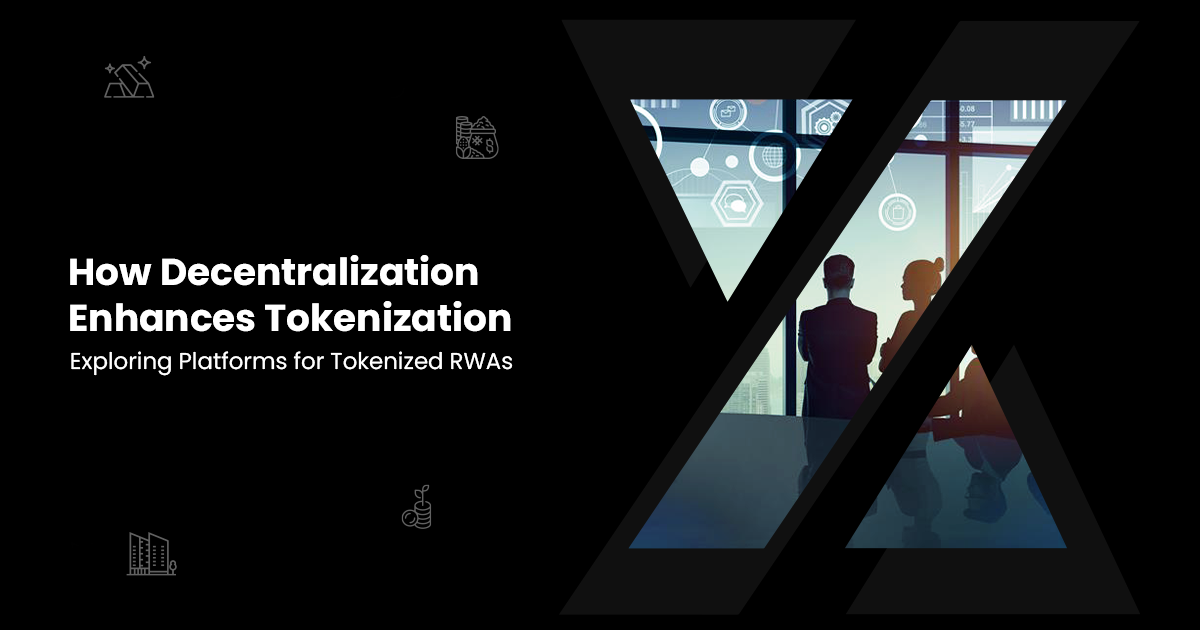Since primitive times, the world has been running with a centralized form of governance or organization. This centralized system has remained highly influential even in the technical field. Decentralization in blockchain refers to the transfer of control, management, and decision-making to a distributed network rather than relying on the centralized entity. Decentralization works to decrease the risk factors and promotes the equal say of all the stakeholders involved. It further encourages people to work with unknown stakeholders without trusting them.
Withstanding the digital standpoint, decentralization in tokenization exchanges, expedited by blockchain technology aims to facilitate accessibility, transparency, and security. The increment in the alteration of physical real estate into digital real estate has led to the bursting out of various online investment platforms. These online platforms have become an efficient ground for interested people from all sections of society to dig into trading opportunities.
Key Takeaways
- The role of decentralization on the trading platforms for tokenized real-world assets.
- Decentralization allows the distribution of control and decision-making across the network, promoting the democratization of investment opportunities in the tokenized assets.
- Decentralization promotes equal participation among the stakeholders.
- The benefits of decentralization in the trading platforms for tokenized real-world assets include security, transparency, immutability, and elimination of intermediaries.
- Challenges in the decentralized structure can be tackled by addressing them cautiously with resolving measures.
- The core difference between centralized and decentralized models of investments and trading.
Benefits of Decentralized Models for Tokenized Asset
There are various advantages and benefits of decentralization in the investment journey of the investors and also in the trading platforms for tokenized real-world assets (RWAs). It facilitates the users to get involved in the trade and enhance their wealth-making options. Here are a few of the most captivating and significant advantages-
Security
Unlike centralized exchanges, decentralization is essentially more secure as it eliminates the single points of failure and any vindictive steps. The decentralized networks are not limited to a single node and have been distributed across multiple nodes. This reduces the chance of any data manipulation or any kind of cyberattacks. Besides, in decentralization, funds are independently managed by the users as per their whims and fancies, safeguarding their investment and trading journey.
Transparency
Decentralization in trading platforms for tokenized assets offers transparency to the users. It is one of the key features of blockchain technology that ensures that transactions and ownerships are being recorded on a distributed ledger, visible to all stakeholders. It increases trustworthiness amongst the users and decreases the risks associated with the marketplace.
Eliminates Intermediaries
Decentralization in these trading platforms promotes a trustless ecosystem, reducing the need to rely on intermediaries. This step increases accountability where all the transactions are recorded on a shared ledger. It eliminates the need for go-betweens to verify and approve transactions, making the tokenized investments more secure and smooth.
Immutability
The decentralization system depends on the consensus mechanism that ensures all the nodes remain on the same page considering the data stored. This mechanism makes it extremely difficult to tamper or alter any data by a single entity thus setting the seal of immutability. It maintains the integrity of the data as well as the transactions after asset tokenization.
Democratized access
The tokenization of assets has brought a revolutionary idea in the field of digital finances. Further, the decentralization of the tokenized assets promotes the democratization of access by giving the users control and power over their assets or data management. Alongside this, it also lowers the entry barriers to encourage inclusivity from all the strata of users, making digital assets accessible to all. Hence, the decentralization in tokenization exchanges makes the entire process democratic by giving the rights to every entity involved in the trading and investment.
Smart Contracts
They act as fuel that powers the decentralization of the tokenized assets on the trading platforms. The codes and agreements of the smart contract edict the way of managing the tokenized assets. Moreover, Smart contracts ally with regulatory compliance and ensures the users a smooth investment opportunity by automating the process.
Pioneering Ideas
One of the many prominent benefits of tokenization being decentralized is bursting out of various innovative mechanisms like DAO (Decentralized Autonomous Organization) and Decentralized Finance (DeFi). These are the redefining measures in the financial domain. It further aids access to anyone with an interest in the marketplace. DAO facilitates the participation of the stakeholders, ensuring transparency and accountability. DeFi enhances the decentralization of tokenized assets by providing open and permissionless services with no intermediaries.

Addressing the Obstacles of Decentralization in Tokenization
Real-World Asset Tokenization and the trading platforms of tokenized assets, both are building traction in the marketplace. Moreover, many industry giants, institutions, and even small and retail investors are showing interest in these assets and hence contributing to the trading on the trading platforms for the tokenized real-world assets. Here are given a few major challenges and ways to address them in these platforms:
Challenge- Even after expanding market value for the tokenized assets, there remains looming issues for the clear regulatory guidelines that can obstruct further market adoption. Also, there are various countries which have jurisdictions as per their needs and demands, further complicating the already existing vagueness.
Solution- To tackle the regulatory vagueness, it is important to establish clear and comprehensive regulatory guidelines. This approach will provide clarity on the legal status of the tokenized assets, encouraging more investors to participate in the trading and investment.
Challenge- There are a few issues that are prevalent in the trading platforms for the tokenized assets including cyberattack and smart contract exploits. These complications can hinder the trust among the users and can cause them financial losses for them.
Solution- Problems such as the above-mentioned ones can be solved through implementing security measures. A few of the most essential security measures including regular smart contract audits, multi-signature wallets, bug bounty programs, upgradable contracts, and formal verification, can mitigate risks on these platforms.
Challenge- Tokenization is not limited to the mainstream and mass appeal assets such as real estate, commodities, and artworks but has enveloped the niche assets as well. These assets include diamonds, yachts, bullion, and even intellectual property, making these assets prone to market volatility which can impair the participation and execution of these trades.
Solution- These issues can be tackled by developing a strong secondary market for all types of tokenized assets and managing the liquidity in them. This can enhance the services in the marketplace and bring liquidity to the niche assets.
Challenge- One of the most crucial things in the management of the tokenized assets which can be complex due to fractional ownership, market vulnerability, and unclear regulations. These elements can make the process of asset evaluation complex and tiring.
Solution- To avoid such circumstances while evaluating asset valuation, it is inherent to create standardized valuation methodologies. Also, establishing the fair pricing can create transparency and boosts investors’ confidence.

Opposition of Centralization and Decentralization
| Centralization | Decentralization |
| The decision-making in the centralized system remains in the hands of the top level of administration. | The decision-making in the decentralized is distributed across several units within the organizational body. |
| In this model, the flow of information inherently travels down from the bottom. | In this model, the information remains available and open to all levels. |
| Generally, this model is slower as the process is hierarchical in nature and requires approval from the central authority. | This model of investments and trading is faster due to several technical aspects such as blockchain and smart contracts, bringing efficiency of the people. |
| Limited involvement of the people in the decision-making. | Involves all the eligible members, encouraging participation. |
| This model is comparatively more stable as it has unified decision-making. | This model is less instability due to varying decision-making. |

As tokenization in real-world assets is gaining momentum in the market; several platforms allow their trading and investment. One such platform is STOEX.
STOEX is backed by KALP Distributed Ledger Technology (DLT) and strictly adhered to regulatory compliance, ensuring transparency and liquidity. With its structured approach, stringent security, and commitment to compliance, the platform offers an appealing option for diversified and efficient investing. Its regulation, security measures, focus on usability and customer-centric approach make it stand out as an accessible way of trading tokenized real-world assets.
Additionally, STOEX’s vision is to build a ground with reduced entry barriers and encourage a safe ecosystem for every individual interested in investing in the market. It pulls the strings of financial democratization by bridging the gap between investors and high-worth tokenized RWAs.
Conclusion
Decentralization in the trading platforms of tokenized real-world assets has changed the dynamics of digital trading and investments. It enhances security, transparency, and accessibility among the users, making the process of trading and investment efficient and smooth. However, there remains a significant number of challenges even in the model of decentralization. These complications can be addressed through the right approach, hence making the investment journey more refined and streamlined.
As these concepts are still evolving, various platforms are adding to the layer of opportunities and options within these domains. One such option is STOEX, which allows investors to access the marketplace and trade effortlessly.
FAQs
What does decentralization mean in the context of tokenized RWAs?
Decentralization in tokenized RWAs means the removal of central intermediaries (such as banks and financial institutions), with blockchain technology.
How does decentralization enhance security in tokenized assets?
By leveraging blockchain’s immutable nature, decentralized platforms ensure that asset ownership and transaction records are tamper-proof.
Can anyone invest in tokenized RWAs on decentralized platforms?
Yes, decentralization allows for broader access, allowing a wide range of investors’ participation in tokenized RWAs with lower capital requirements.
How does the tokenization of RWAs differ from traditional investment vehicles?
Tokenization offers fractional ownership, 24/7 trading, and increased liquidity, whereas traditional investments often require significant capital, and have restricted trading hours.
What are the risks of using decentralized platforms for tokenized RWAs?
Risks include smart contract bugs, platform vulnerabilities, market volatility, and regulatory uncertainty. However, security measures like audits and insurance are being developed to mitigate these risks.


